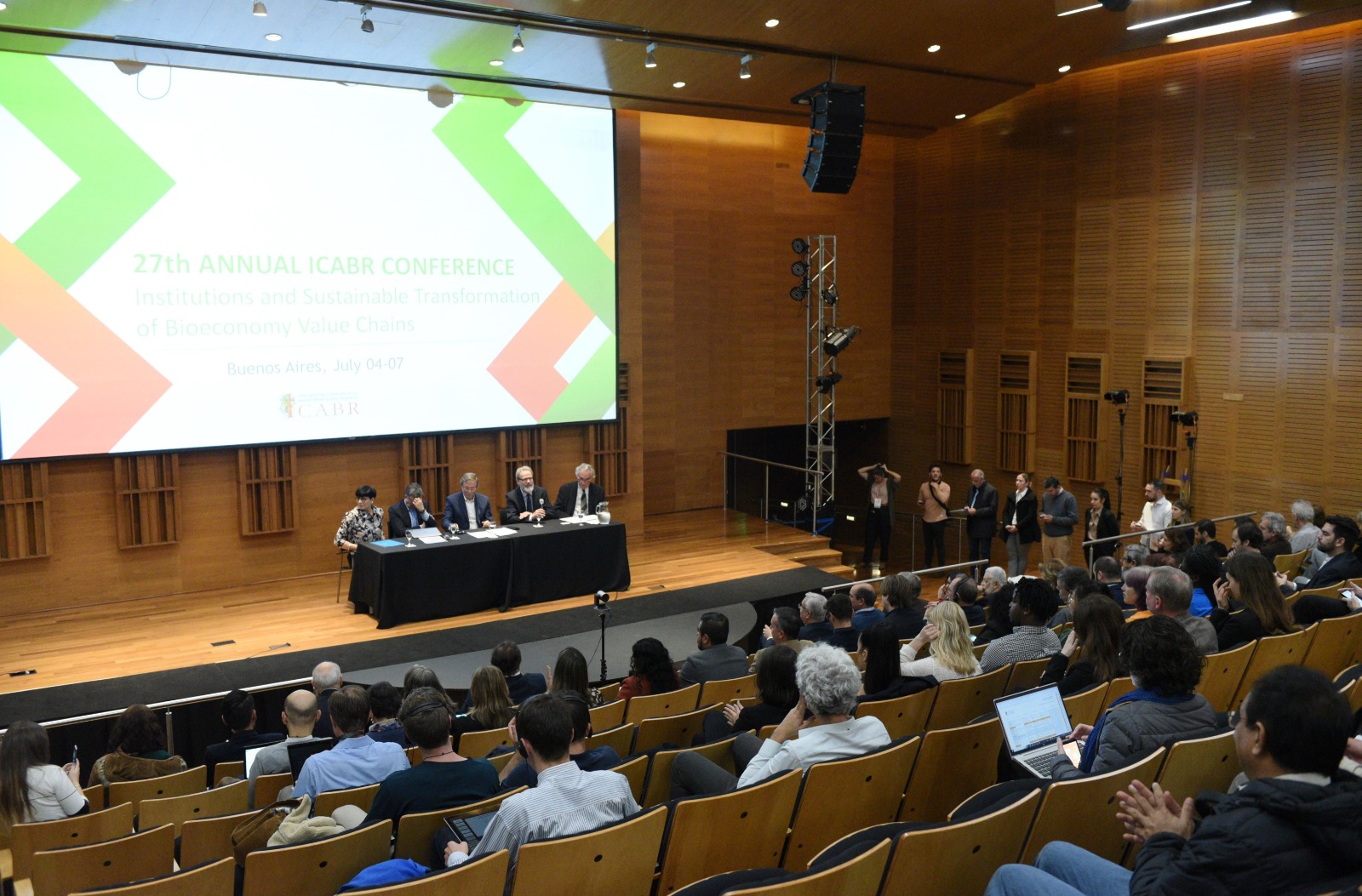The 27th Annual Conference of the International Consortium on Applied Bioeconomy Research (ICABR), which took place over 4 days in Buenos Aires, brought together more than 150 researchers and scientists from the Americas, Europe and Africa, who are specialists in the bioeconomy, in addition to policy experts, entrepreneurs and bioentrepreneurs.

Buenos Aires, 10 July 2023 (IICA) – The 27th Annual Conference of the International Consortium on Applied Bioeconomy Research (ICABR) highlighted the tremendous strides in the Latin American bioeconomy and its immense potential to continue growing.
More than 150 researchers and scientists from the Americas, Europe and Africa who are specialists in the bioeconomy, in addition to policy experts, entrepreneurs and bioentrepreneurs, gathered for four days of intensive work and debate in Buenos Aires. The bioeconomy has emerged as a new development opportunity for the region, based on the efficient, sustainable and inclusive use of natural resources and biodiversity, for industrial purposes.
The meeting, held for the first time in Latin America, was co-organized by Argentina’s Secretariat of Agriculture, Livestock and Fisheries (SAGyP), its Ministry of Science, Technology and Innovation (MinCyT), ICABR and the Inter-American Institute for Cooperation on Agriculture (IICA).
Eminent academics discussed various perspectives on the bioeconomy in the region with representatives from biotechnology, biofuel and bioinput companies, in eight plenary sessions and several workshops. Some of the issues addressed were the current bioeconomy scenario around the world, new bioproduct and bioservice value chains, international trading of gene-edited products, the role of biofuels in decarbonization and methodologies to measure the bioeconomy.
One of the most significant outcomes of the conference was the creation of the Latin American Bioeconomy Network by 25 public, private and academic institutions, as well as regional and international cooperation agencies, during a workshop convened by IICA. The specialized agency for agricultural and rural development in the Americas will serve as the Executive and Technical Secretariat of the Latin America Network, based on a unanimous decision by the members.
The hope is that the Latin American Bioeconomy Network will become a forum for discussion, sharing and development among the region’s leading bioeconomy experts.
Ideally, it will facilitate the management of knowledge, good practices and lessons learned among the member organizations. The workshop participants that spearheaded the creation of the network were bioeconomy decisionmakers from Mexico, Costa Rica, Ecuador, Colombia, Argentina, Guatemala, Brazil, Uruguay and Paraguay, and representatives of international, regional and national organizations.
Regional perspectives
Hugo Chavarría, Manager of IICA’s Innovation and Bioeconomy Program, pointed out that although the bioeconomy has matured in the region in recent years and seen many production developments, particularly in terms of biotechnology applications, biofuels, bioinputs, low-carbon agriculture and ecosystem services, among other areas, much remains to be done.
He stressed that, “Latin America is synonymous with biological resources. We have only 15% of the world’s land area and 8% of the population; yet we have 50% of its biodiversity and 23% of its forests”.
He warned that, “Notwithstanding, we must advance considerably to fully identify and harness our resources. Today, our region has only mapped and documented between 20 and 30% of our biodiversity. Therefore, we cannot capitalize on it”.
Chavarría also stressed that much of the biomass produced in Latin America and the Caribbean is still considered to be waste and we have a far way to go in developing bio-based industries. He said that, “Approximately 66% of exports from our region are primary products, with no value-added component”.
Finally, he reflected that, “New bioeconomy-related industries must be developed in rural areas to generate employment and income that will benefit vulnerable communities. Some countries have introduced national bioeconomy plans and many of them are working, with the support of international organizations. However, that is not enough. We must pick up the pace in sensitization, capacity building, regulations, research, development and investment, in order to add value to our agricultural production in an environmentally friendly manner and to become global bioeconomy leaders”.
Participants at the closing of the conference included Juan José Bahillo and Daniel Filmus, Argentina’s Secretary of Agriculture and its Minister of Science, Technology and Productive Innovation, respectively, along with Justus Wesseler, President of ICABR, and IICA Director General, Manuel Otero.
Wesseler, an academic from the University of Wageningen in the Netherlands and a specialist in biotechnology and the contribution of value chains to sustainability remarked that, “The conference has been extremely successful thanks to the participants from Latin America and the rest of the world. It has demonstrated that the region has many bioeconomy-related projects in the pipeline as well as extensive research, given the growing interest of the academic community. It would be extremely worthwhile to ensure that public policy makers are made aware of this”.
In closing, the ICABR President stressed that, “Latin American can benefit tremendously from greater development of the bioeconomy. This calls for greater investment to translate the many research projects into practice. Thus, the bioeconomy must be given a greater role in the regional agenda”.
More information:
Institutional Communication Division.
comunicacion.institucional@iica.int
Hugo Chavarría, Manager of IICA’s Innovation and Bioeconomy Program.
hugo.chavarria@iica.int











